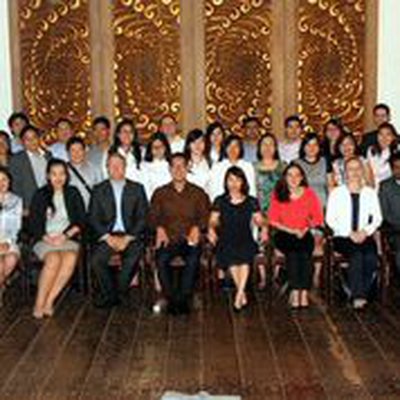28 Oct 2014
WTI co-hosts international conference with SECO partners in Jakarta
In partnership with the Universitas Pelita Harapan (Jakarta) and the Foreign Trade University (Hanoi), several current researchers and alumni from the World Trade Institute and the NCCR Trade took part in two days of informed scholarship and stocktaking from the ASEAN region and beyond on the challenges, roadblocks and prospects that the region faces on the way to realising ASEAN’s Economic Community aims by 2015.
The conference - “Towards the 2015 ASEAN Economic Conference (AEC): Progress and Prospects” - was held in the framework of the SECO-funded academic cooperation project entitled “Regional competence centres of international trade law and policy”. It was hosted by UPH in Jakarta on 14-15 October 2014.
An edited volume featuring the best papers presented at the conference will be published jointly by the three academic partners.
Agreed by ASEAN Leaders at their 13th ASEAN Summit in 2007 and subject to an accelerated timetable since 2009, an ASEAN Economic Community (AEC) aims to be established in 2015. ASEAN member states have registered considerable progress in implementing the AEC Blueprint.
To date, members have implemented roughly three quarters of the steps agreed with a view to transform ASEAN into a region with free movement of goods, services, investment, skilled labour and the freer flow of capital. Implementation of the AEC Blueprint has contributed to significant trade- and FDI-led region-wide expansion, fuelling the region’s economic dynamism and inserting producers in regional and global value chains at a time of heightened global uncertainties. The ASEAN region remains the most trade-oriented among the major regional integration areas linking developing countries, with continued high reliance on foreign direct investment (FDI) as a driver of the trade and economic growth agendas in the region.
Risks and challenges
However, continued overdependence on uncertain external demand creates risks and vulnerabilities and policy-makers need to pay close attention to reducing development and income gaps within and between countries in the region whilst also ensuring that regional connectivity continued to rise through the adequate supply of regional public goods. With just over a year left until the AEC is to be established, ASEAN Member States face the fundamental challenge of ensuring synergy between the AEC Blueprint and the pursuit of national economic reforms.
The joint conference allowed a group of young scholars, several of whom are faculty members of the WTI’s SECO project partners in the region, as well as a number of researchers drawn from the ranks of WTI and NCCR-Trade, to present work on a range of issues – from trade facilitation and labour market integration to monetary cooperation, renewable energy and institutional reform – at the core of ASEAN’s integration journey.
The conference also coincided with - and embedded – the launch of the WTO Chairs Program at UPH, which is to be hosted by UPH’s newly established Centre for International Trade and Investment (UPH-CITI). The Chairs Program was originally launched in 2010 as a pilot trade-related academic capacity-building project. Much like the SECO academic cooperation project, the WTO Chairs Program aims to enhance knowledge and understanding of the multilateral trading system among academics and students in developing countries through teaching, research and outreach activities in partner institutions.
Honour for UPH
The WTO’s decision to reward UPH with a Chair is a prestigious honour, as only seven out of a total of 77 competing academic institutions worldwide were selected by means of a competitive tender process. Academic institutions selected to participate in the WTO Chairs Program receive financial and substantive support for four years in the areas of curriculum development, research and outreach activities. UPH is now the second university in Indonesia to have been awarded a WTO Chair (the first being University Gadjah Mada), which is itself a rare distinction for Indonesia, since no other WTO Member has been honoured in the same way.
The choice of UPH owes in no small measure to the strong links that the WTI has nurtured with its Indonesian partner under the SECO project, not least UPH’s innovative Masters on Trade, Investment and Competition (MTIC), now in its second year of deployment. In their remarks at the launch ceremony, which was also attended by WTO Deputy Director General Xiaozhun Yi, both the Indonesian Trade Minister, Mohammad Lutfi, and Prof. John Riady, Head of UPH’s Faculty of Business, Law and Politics, recalled the central human capital challenge that Indonesia faces in implementing the country’s trade and economic integration strategy.
In his opening remarks to the conference, Prof. Riady praised the WTI for imparting a vision of academic excellence in trade-related education and research that the University has pursued since joining the SECO Project. Said Riady: “Little of what we celebrate today would have been possible without the support and guidance of the WTI and the Swiss government. Our success today is also theirs.”


